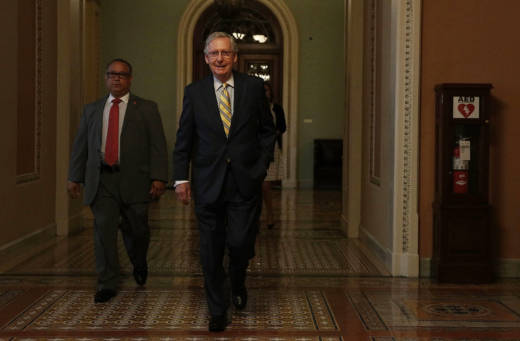In their summary of the bill, Senate Republicans laid out the major provisions. Here are some of those big changes that this new version of the bill would make to the original BCRA, and what they would mean:
Health savings accounts will be able to pay for premiums. Under IRS rules, people with high-deductible plans are eligible for health savings accounts (HSAs), accounts into which people can put money for health care expenses tax-free. Under this bill, people would for the first time be able to use that money for premiums. Americans' deposits in HSAs have ballooned over the last decade, according to HSA consulting firm Devenir. However, those accounts also tend to benefit higher-income people more than others, as Kaiser Health News' Michelle Andrews wrote in December — for example, richer people are more likely to have the extra money to sock away for health expenses.
More money for the opioid epidemic. The Senate's initial bill offered $2 billion to address the opioid crisis for 2018. This version would offer about $45 billion over 10 years, which is what Ohio Sen. Rob Portman and West Virginia Sen. Shelley Moore Capito, both Republicans, had requested at one point. However, some experts say that around $4.5 billion a year is nowhere near enough for combating America's massive opioid epidemic, as the New York Times reported in June.
Keeping some Obamacare taxes. The first BCRA version would have repealed an array of Affordable Care Act taxes, which would have overwhelmingly benefited higher-income Americans. This newer version of the bill keeps some in place, including the net investment income tax and a payroll tax that hit higher-income Americans.
Allowing insurers to offer non-Obamacare-qualified plans. This mirrors an idea that Texas Sen. Ted Cruz and Utah Sen. Mike Lee had proposed in recent weeks: The Senate's bill would allow an insurer to offer skimpier plans. As long as an insurer does offer a plan on the individual insurance exchanges that meets the demands of Obamacare's Title I (for example, covering certain areas like preventive care and protecting people with pre-existing conditions), that insurer will be allowed to offer additional plans off of the individual insurance exchanges that don't meet those criteria.
That idea had created worries of a two-tiered insurance system — one in which older and sicker people would opt into the more comprehensive plans, while younger and healthier people would choose the cheaper plans that covered less, potentially causing a "death spiral" on the exchanges for those older and sicker people.
Extra money for high-risk customers. If an insurer offers one of those plans that meet the Obamacare criteria, that insurer would be eligible for money from a fund designed to help high-risk customers, which could potentially mitigate some of the two-tier issues created by new, nonqualified plans.
Extra stabilization money. The original version of the BCRA provided $112 billion that would have allowed states to stabilize their markets or help high-risk customers in a wide variety of ways. In this version, that is bumped up to $182 billion.
This all means that the new version doesn't make major changes to one big part of the BCRA: Medicaid. Under the original Senate bill, the Obamacare Medicaid expansion would be rolled back, and Medicaid spending would be capped — states would either be allotted a certain amount per capita, or they could get a block grant instead. It also caps Medicaid spending growth in the medium-to-long-term. This bill doesn't change any of that.
According to the CBO, the original BCRA would have cut Medicaid spending by $772 billion over 10 years, and would have resulted in 15 million fewer Medicaid enrollees by 2026 than under current law.
A new CBO score on the bill is expected Monday or Tuesday. By the end of next week, there is likely to be a key procedural vote. That would put things on track for a final vote the following week.
Were this bill to pass the Senate, it would then have to be reconciled with the House's attempt to repeal and replace Obamacare, known as the American Health Care Act.
Meanwhile, Republicans Bill Cassidy of Louisiana and Lindsey Graham of South Carolina released an alternative plan Thursday morning.
A summary of the bill is embedded below. You can read the full draft here, and see the previous Senate version here.
Washington Desk editor Arnie Seipel contributed to this report
Copyright 2017 NPR. To see more, visit http://www.npr.org/.
9(MDAxOTAwOTE4MDEyMTkxMDAzNjczZDljZA004))

9(MDAxOTAwOTE4MDEyMTkxMDAzNjczZDljZA004))